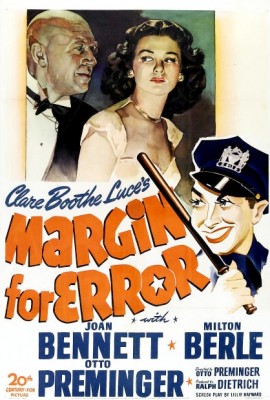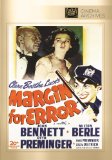| Reviews & Columns |
|
Reviews DVD TV on DVD Blu-ray 4K UHD International DVDs In Theaters Reviews by Studio Video Games Features Collector Series DVDs Easter Egg Database Interviews DVD Talk Radio Feature Articles Columns Anime Talk DVD Savant Horror DVDs The M.O.D. Squad Art House HD Talk Silent DVD
|
DVD Talk Forum |
|
|
| Resources |
|
DVD Price Search Customer Service #'s RCE Info Links |
|
Columns
|
|
|
Margin For Error
Like most of Fox Cinema Archives' pre-widescreen era releases, the video transfer is excellent though there are no extras.
Aboard a troop carrier bound for Europe, soldier Moe Finkelstein (Berle) is distressed when other soldiers accuse fellow enlistee Max von Alvenstor (Carl Esmond) of being a Nazi. Moe offers the following story, told in flashback.
While working as a police offer, Moe is assigned the unenviable task of protecting the Nazi residents and guests of the German consulate, particularly despised German Consul Karl Baumer (Otto Preminger, who also directed the film). Moe initially protests the duty, offended that he, a Jew, should have to protect anti-Semitic Germans, but finally he agrees because, well, after all, this is America.
Baumer has secretly been squandering Nazi funds intended for propaganda purposes and, later, sabotage, to feed his gambling addiction. Baumer's secretary, in fact Nazi Baron Max von Alvenstor, is obliged to submit a damning financial report to Baumer's superiors, but the strident Baumer blackmails Alvenstor with evidence that his grandmother, a woman he never met, was actually Jewish, and threatens to expose the secretary and ruin him.
Meanwhile, Baumer's Czech-American wife (Joan Bennett, top-billed but largely incidental) is in love with Alvenstor, and he with her. She's continued to stay married to Baumer only because he's blackmailing her as well, threatening her Czech father, held prisoner in a concentration camp. At the same time, Baumer plots with Otto Horst (Howard Freeman), the fat leader of the American bund, to blow up an ship carrying arms bound for England.
Moe, meanwhile, tries to keep the peace as protests by Jewish but also non-Jewish German- and other European-Americans intensifies - they actually carry torches at one point - and Moe begins a romance with the Consul's non-Jewish maid, Frieda (Poldi Dur), taking her on a date to see Confessions of a Nazi Spy (a Warner Bros., production, interestingly).
The movie was adapted from a play by Clare Boothe Luce, which in turn was based on Fiorello La Guardia's appointment of Jewish Police Captain Max Finkelstein to lead a squad of Jewish officers to protect the German consulate in 1938. In the play Finkelstein was also called Max, but changed for the film after the real Finkelstein committed suicide, possibly relating to corruption charges. The play, also directed and co-starring Preminger, opened less than two months after the start of the war, in November 1939, and featured Sam Levene as Finkelstein.
The movie version, adapted by Lillie Hayward and Samuel Fuller, is quite unusual by wartime Hollywood standards in that Finkelstein and other officers assigned duty there are explicitly Jewish. Wartime Hollywood rarely was this forthright about anti-Semitism; most of the Jewish-run studios in Hollywood generally avoided such topics during the war, and it's somewhat ironic that Fox, run by Protestant-raised Darryl F. Zanuck, would encourage movies like this and the later, daring Gentleman's Agreement.
The movie of the play also goes out on a creative and political limb in making Baron Max von Alvenstor, a loyal Nazi until his Jewish roots are exposed, a sympathetic character. And the movie again and again pleads for tolerance toward German and Italian Americans, also unusual.
Where To Be or Not To Be deftly balanced comical and murderous Nazi characterizations, in Margin of Error it's less successful. Preminger, self-styled into an Erich von Stroheim-type aristocratic sadist, is very hammy and Howard Freeman's character is merely a buffoon, but longtime character player Carl Esmond comes off extremely well as the German in the midst of a major identity crisis. (Esmond's career stretched from the early 1930s to 1985, and he lived to be 102.)
But the movie belongs to Milton Berle, then more a name on radio than a film star, though he appeared in quite a few movies during the early 1940s. His performance here is very impressive, with none of the brash mugging and compulsion to hog the camera one usually associates with his TV years and other scattered film work. In Margin for Error Berle demonstrates fine acting ability rarely tapped elsewhere.
Video & Audio
Margin for Error's opening titles are windowboxed, and the rest of this full-frame transfer looks very nice indeed, even on big screens. The mono sound (English only with no subtitle options) is also fine, though one longs for Extra Features. Here, not even a trailer.
Parting Thoughts
Not great as either a comedy or as a drama but plenty interesting for other reasons, Margin for Error is enthusiastically Recommended.
Stuart Galbraith IV is the Kyoto-based film historian and publisher-editor of World Cinema Paradise. His credits include film history books, DVD and Blu-ray audio commentaries and special features.
|
| Popular Reviews |
| Sponsored Links |
|
|
| Sponsored Links |
|
|
| Release List | Reviews | Shop | Newsletter | Forum | DVD Giveaways | Blu-Ray | Advertise |
|
Copyright 2024 DVDTalk.com All Rights Reserved. Legal Info, Privacy Policy, Terms of Use,
Manage Preferences,
Your Privacy Choices | |||||||















